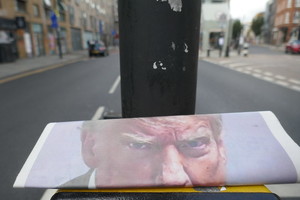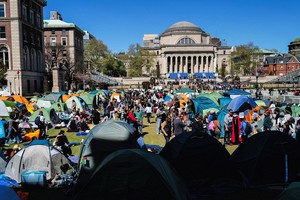When the Republican Primary Disappears

Predicting anything related to Donald Trump is a dangerous endeavor under any circumstances, and it may be even more foolhardy given his current dual roles as a presidential front-runner and criminal defendant. But when several of the Republicans seeking their party’s presidential nomination gather in Milwaukee about two weeks from now for the first debate of the 2024 election cycle, Trump’s participation in that program is now looking increasingly unlikely. Even if the former president does not appear in person, he will cast an immense shadow over the discussion; the most newsworthy soundbytes from the other candidates will almost certainly be about his growing legal troubles.
Whether on stage or not, Trump will dominate the debate just as he has dominated the entire pre-primary calendar to date. Just as he has dominated the American political landscape for the last eight years. Just as he will continue to dominate the election conversation until he is defeated, withdraws, or is elected.
The difficulty confronting his challengers was in stark relief last week. Ron DeSantis announced a sweeping economic agenda. Other candidates were on the campaign trail in Iowa, New Hampshire, and in Chris Christie’s case, Ukraine. But Trump was in the courtroom, and everything that the rest of the field said or did was processed in the context of what they thought about his most recent indictment. That is, if they were noticed at all.
In addition to Christie, the Republicans who have been harshest in their criticism of Trump have been lower-tier candidates such as former Arkansas Governor Asa Hutchinson and former Texas Congressman Will Hurd. DeSantis and former vice president Mike Pence both became slightly more confrontational after Trump’s most recent indictment, and both were rewarded for their subdued efforts with a modicum of news coverage. Meanwhile, the rest of the field may be the only people in the country who are not talking about the various charges that have been filed against Trump.
The question then becomes how any of the other candidates can become competitive in the race if no one notices that they are running. It now appears that the only way for them to attract significant media and public attention is to talk about Trump. But given their fear of being booed by Republican grassroots activists (as Pence, Christie, and Hurd have already experienced), most of the rest of the contenders are campaigning as if this were a normal primary campaign and they were running against Mitt Romney or John McCain rather than a former president facing three – and soon four – indictments.
This dynamic may change as the primaries draw closer, but that will almost certainly not happen by August 23, the date of the first debate, or September 28, when the second one will take place. These early encounters are usually valuable opportunities for trailing candidates to make a name for themselves, but it appears that this year the others will either forfeit that opportunity or tiptoe so gingerly in Trump’s direction that the impact will be minimal at best.
All of which is great news for Trump. As long as he is able to continue to eclipse the rest of the field, the less reason GOP primary voters will have to reconsider their support for him. New polling last week revealed that his backing among Republicans will not significantly weaken unless he is found guilty of the charges he is facing. (A conviction would cost him about one half of his existing voting base.) His lawyers are working feverishly to delay the court proceedings so a verdict can not be reached until after the election. But even a greatly accelerated court calendar would probably not conclude before Republicans select their nominee sometime next spring.
Since it appears that a judge and jury will not derail Trump from his current path to the nomination, the task falls to the candidates running against him. But that will require at least some of them to be willing to confront him, rather than continuing to hope that primary voters change their minds on their own.
The clock is ticking—or at least the calendar is (if calendars can tick). But either way, at some point soon, the other candidates must decide whether risking the wrath of Trump and his supporters is a gamble worth taking in order to have any legitimate shot at the GOP nomination. And every day that passes, and every debate that occurs, the odds against them become even more daunting.
Want to talk about this topic more? Join Dan for his webinar "Politics In The Time of Coronavirus." Or read more of Dan’s writing at: www.danschnurpolitics.com.
Dan Schnur is a Professor at the University of California – Berkeley, Pepperdine University, and the University of Southern California, where he teaches courses in politics, communications and leadership. Dan is a No Party Preference voter, but previously worked on four presidential and three gubernatorial campaigns, serving as the national Director of Communications for the 2000 presidential campaign of U.S. Senator John McCain and the chief media spokesman for California Governor Pete Wilson. He has a Center bias.
This piece was reviewed and edited by Isaiah Anthony, Deputy Blog Editor (Center bias).

April 26th, 2024

April 25th, 2024

April 25th, 2024